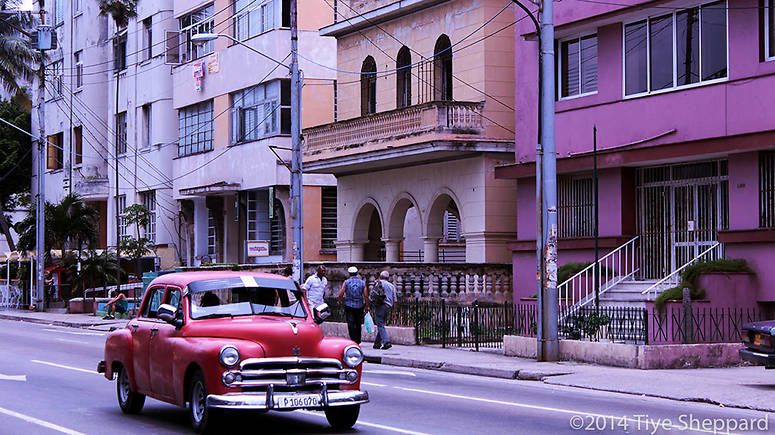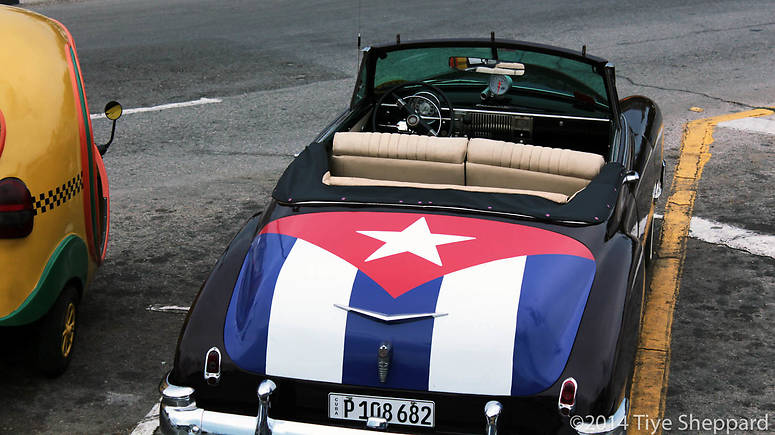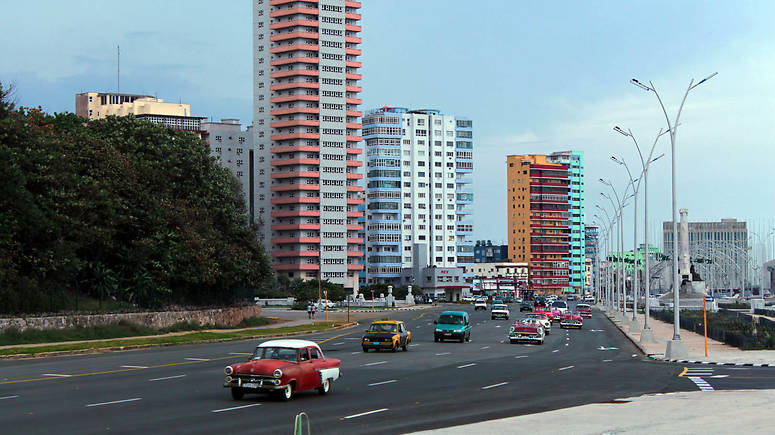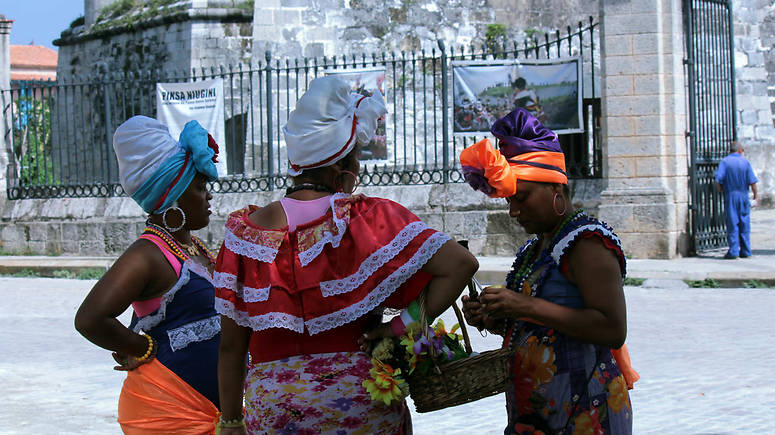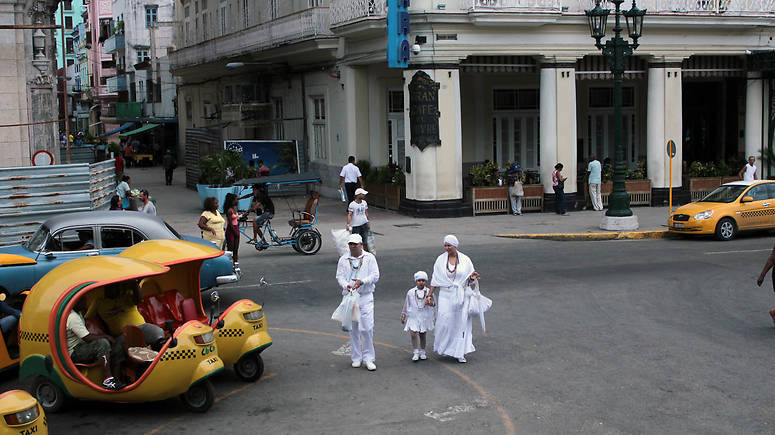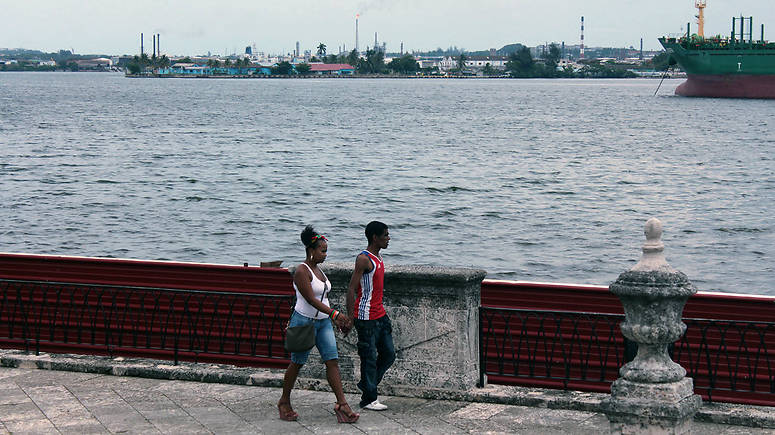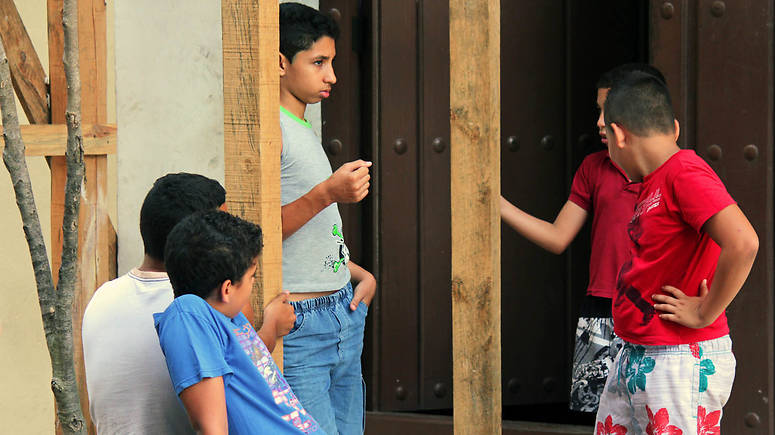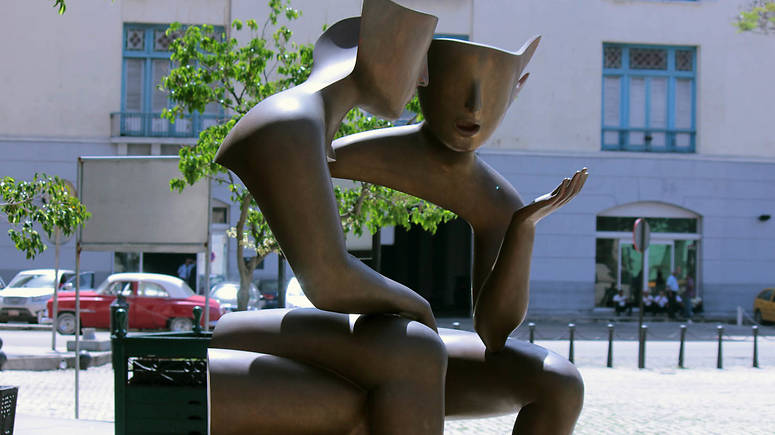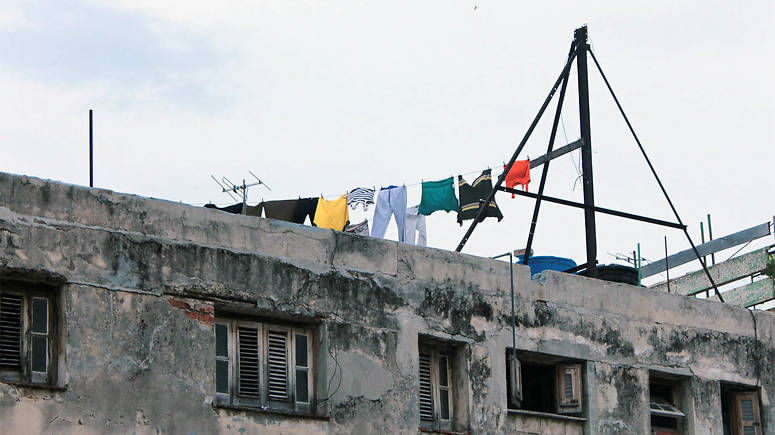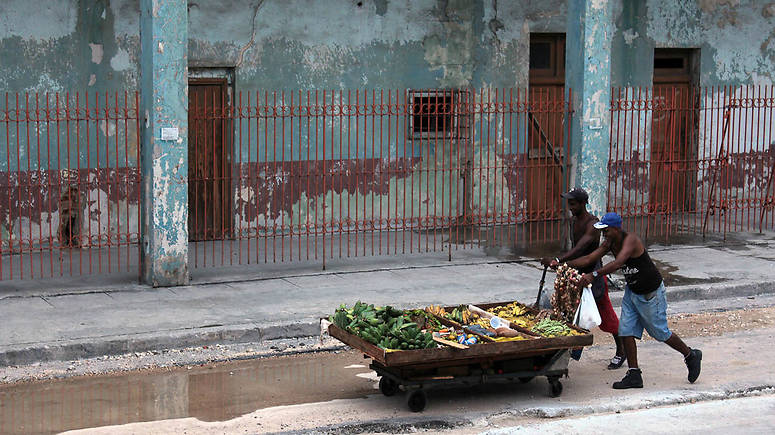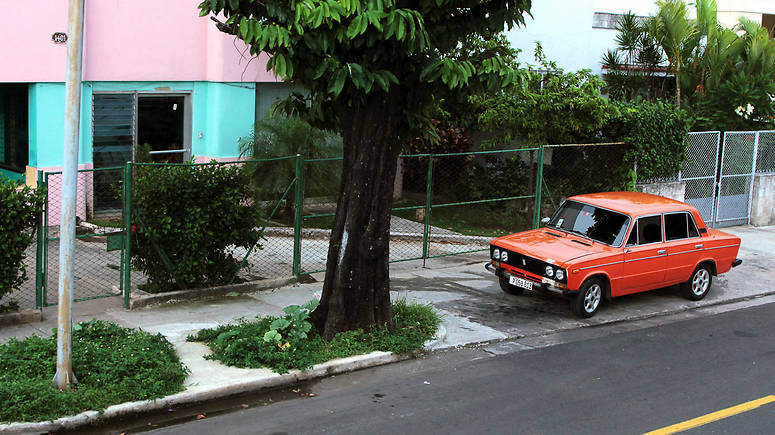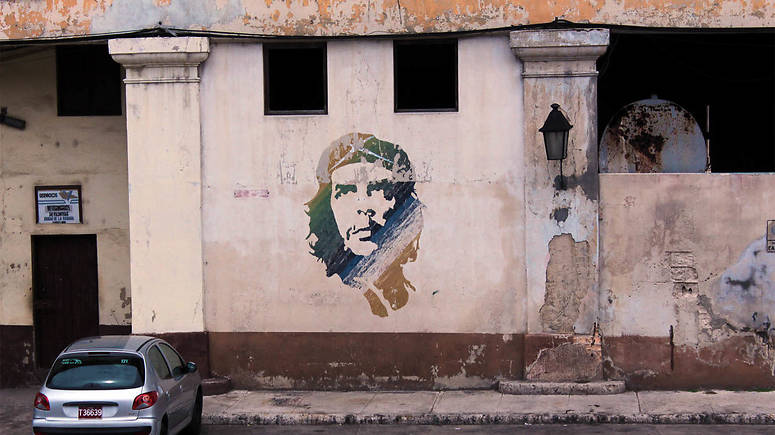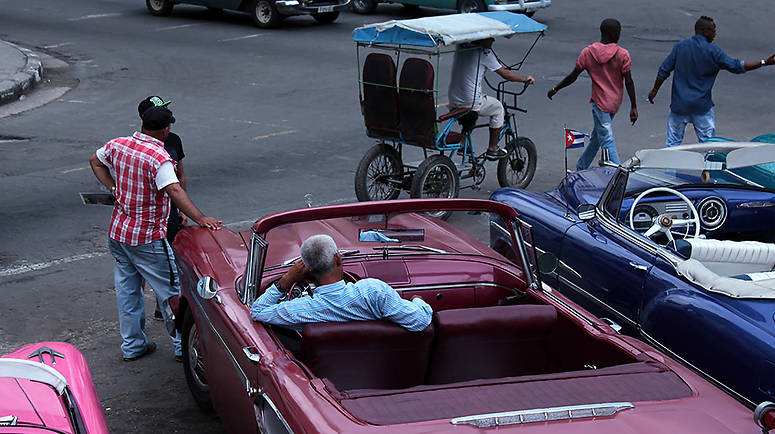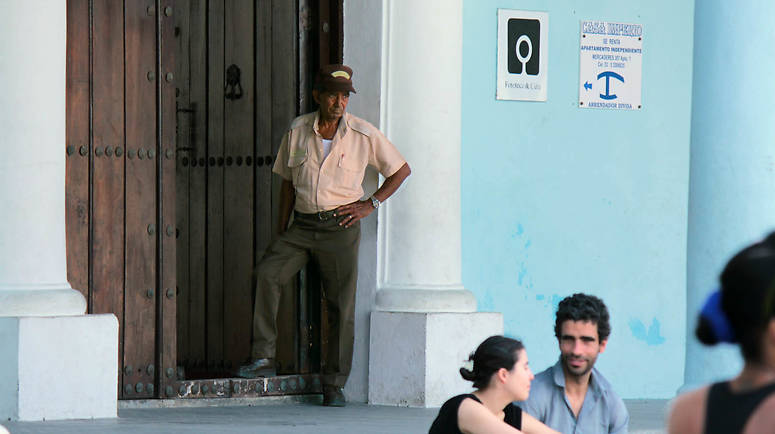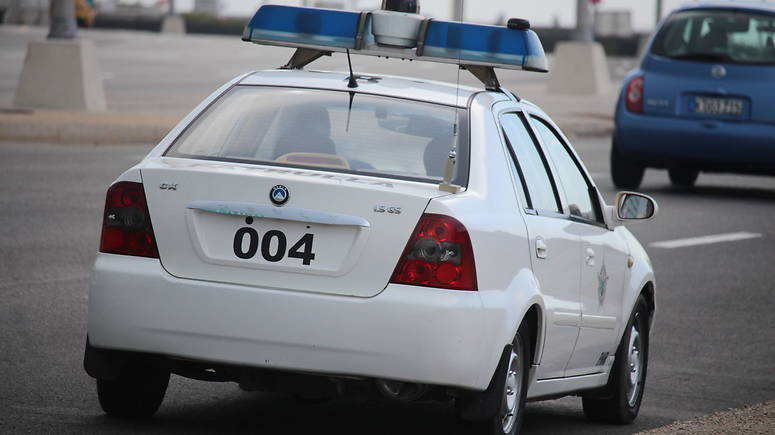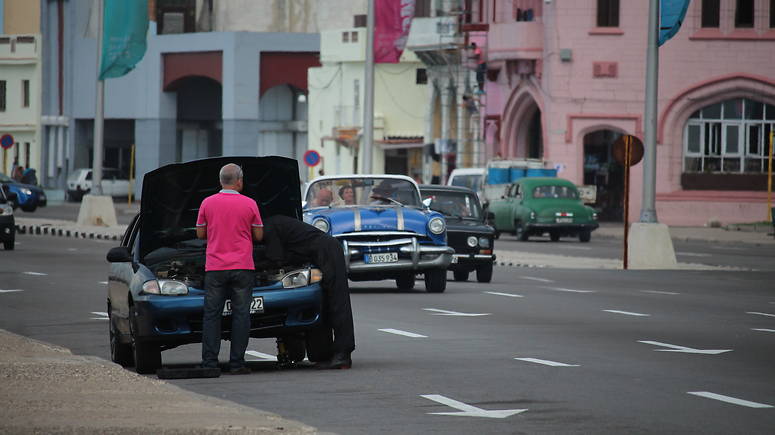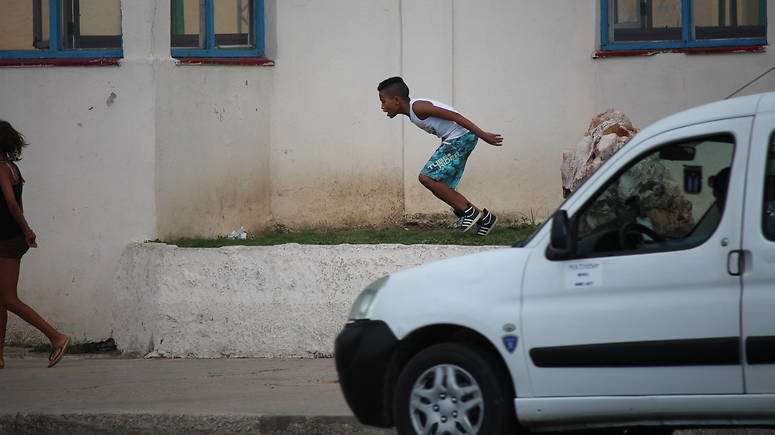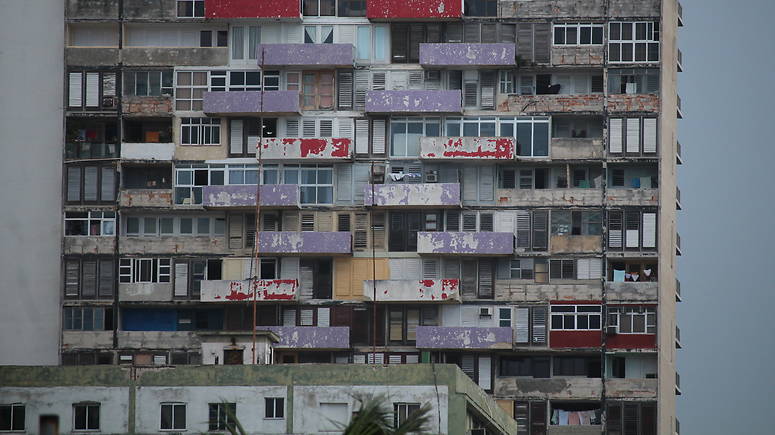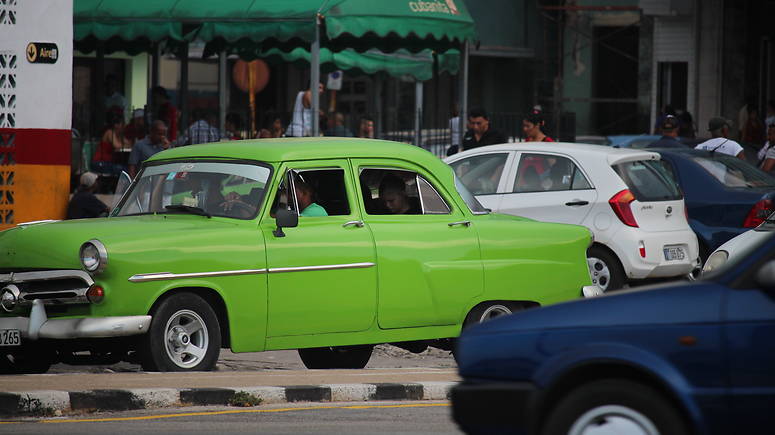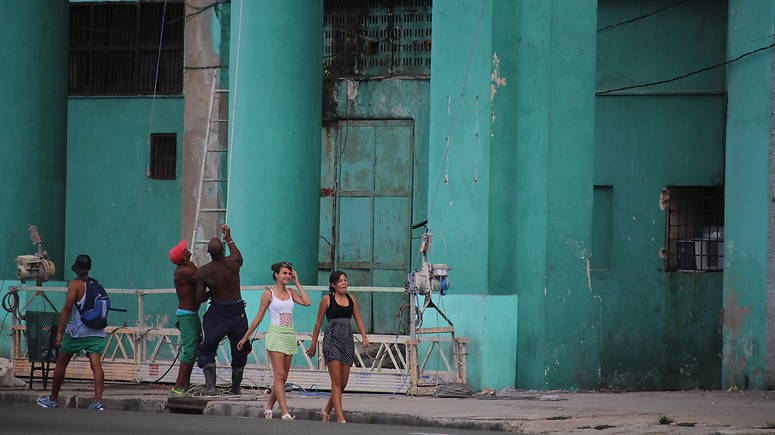
A collaborative publication of the Latin American Studies Program
Divisadero
Fall 2015
Our Eyes in Havana
After the Cuban revolution in 1959, the United States has been on edge with their neighbor separated by only 90 miles of water. Castro’s ties with the Soviets damaged relations with the United States during a hot period of the Cold War. Any tidbit of information that comes from Cuba is fascinating enough for its exclusivity, but deserves to be examined in order to fully comprehend the socialist country. Divisadero alum, Tiye Sheppard, was fortunate to explore Cuba with her own senses. Tiye has graciously debriefed me on her experiences in Cuba which are detailed below. By fitting her story in the larger picture we piece together the socialist conundrum.
Cuba has been a persistent enigma for the United States. The island country has persevered for decades despite sanctions enacted by the international community. United States foreign policy has hampered Cuba’s economy with an embargo since 1955. However, relations with other countries in Latin America have helped the Cuban government survive. The inharmonious history between Cuba and the United States has kept Americans mostly in the dark about its Cuban neighbors.
For years, American visitors have had to reroute their flights from another country to make it to Cuba. Recently the Obama administration has alleviated travel restrictions between the two countries. Although tourism is still illegal it is possible for Americans to travel for purposes that improve the condition for Cubans, such as education or health[i]. Traveling to Cuba still involves a game of hop-scotch with airline flights. Fortunately, since the two countries have renewed talks, Americans have the greatest opportunity yet to dig deeper into Cuba in order to better understand it. The U.S. has even gone as far as re-establishing an embassy after 54 years.
One of these American citizens to venture into Cuba is Tiye Sheppard. Tiye studied here at the University of San Francisco and graduated in 2014. She was born in the Dominican Republic, but has been a longtime resident of the Mission District. Tiye herself has written numerous articles for Divisadero with topics that relate to her Caribbean background. One of the subjects she has written about is Dominican born author Junot Diaz, who won the MacArthur “Genius” Fellowship grant not long after her article on him. Tiye as well has received various accolades for her work. Her impressive portfolio won the Belva Davis Award from the Bay Area Black Journalists Association. Shortly after Tiye Sheppard graduated from USF in 2014, she was admitted into a fellowship program to study at the University of La Havana, Cuba.
Tiye was chosen to be part of an academic exchange program between the countries. This has become easier for universities to coordinate now that the red tape has been loosened on applications[ii]. Since then Tiye has visited Cuba two more times. Her first visit was in a guarded environment where the things she came across would only confirm what she already learned about Cuba in the United States. It was on her third trip where asking questions revealed more information, but ruffled the wrong feathers. Inquiring on certain aspects of life in Cuba may fall under counter-revolutionary activity. It can be as overt as speaking out against the government in public, or as covert as asking about race relations in a private conversation.
In a communist country like Cuba, the government goes to great lengths to ensure the status quo is as strong as it was during the revolution. As a result, privileges such as freedom of the press do not exist. The government controls the flow of information in and out of the country. Broadcasting stations are owned and controlled by the state[iii]. Internet access is expensive, slow, and highly regulated. The Cuban government’s restrictions also weigh heavily on foreigners visiting the country. A special journalism visa is required to simply ask questions around La Havana. Without this, curiosity unexpectedly found Tiye in a precarious position with the police.
Being on an educational mission, it is only natural to ask questions. It benefits students in foreign countries to grasp the academic, social, and political environment of their international hosts. Unbeknownst to Tiye, this has been ingrained in Cuba to be perceived as a threat. Tiye would have encounters where frankly spoken conversations turned into a script that Castro would approve. This drastic change of tone would suggest that an unknown person had entered the space of their conversation. Counter-revolutionary activity is scoured by the Cuban government.
It cannot be helped but to ask certain questions in Cuba though. The dual currency distribution is an aspect of Cuba that begs to be examined. The lower currency is circulated mostly amongst poorer, often black Cubans while white Cubans possess more of the higher currency. Ironically, this has created a stark divide of classes in communist Cuba. Tiye observed that the predilection Cubans have to present themselves nicely with clothing and accessories when out in public only added fervor to the economic disparity. Making matters worse is how certain establishments only accept the higher currency. Paying up to the higher currency in this situation would mean spending more of one’s own government income, which usually amounts to twenty dollars a month. Consequentially, Cubans without the higher currency are left out of certain restaurants and night clubs. Prejudiced business practices like these have allowed wealth to be hoarded over generations for the benefit of certain families or groups in Cuba.
The allowance of remittances has further exacerbated the wealth gap. This was banned under previous administrations. Only until 2009 has Obama the eased the restrictions on the amounts of money Americans can send to Cubans in their support. Cuban-Americans who strive in areas such as Miami are able to give their relatives a much needed financial boost. Adversely, remittances have raised income inequality to the point where the Cuban government has tried to limit them[iv]. Cubans with wealthier relatives abroad can be seen walking past decaying colonial buildings while wearing designer headphones hooked up to MP3 players. This image does not coincide with what one imagines about life in a communist country.
American perception of Cuba will continue to change as more interaction develops between the two countries. Outdated ideas of what Cuba is, given by ex-patriates, will shift to what visitors like Tiye can tell us. The obscured lenses that generate criticisms from public figures like Ted Cruz or Marco Rubio appear to be stuck in the 1950’s. Tiye compares their critiques to claiming that the United States has not changed in 60 years itself. Obviously this is not the case. Although parallels can be drawn if one is one tries hard enough, America has changed.
The same could be said for Cuba. Even though the government imposes the status quo brought on by the revolution, it cannot avoid certain transformations. When the Soviet Union collapsed in the 1990’s, so too did their subsidies for the Cuban government[v]. As a result, income for Cubans has been less than 30% than before the withdrawal of Soviet subsidies. Venezuela stepped in trying to fill the void which created a unique relationship between Hugo Chavez and Fidel Castro. Those ties have been strained as Venezuela faces its own issues with inflation and shortages of important staples for a good quality of life[vi]. Cuba has undergone many changes in the past couple of decades, and the United States government has closely monitored them. The country has long been viewed as a threat to capitalism, but Obama’s restoration of full diplomatic talks hopes to circumvent that. Cuba itself has scrupulously kept a watchful eye on its citizens and visitors to catch threats to communism.
There are many tools of surveillance at the disposal of the Cuban government. Tiye had encounters with several of them herself. In every neighborhood there exists an elected group of people who report counter revolutionary activity to the police. These are called Committees for the Defense of the Revolution (CDR)[vii]. A CDR might have made sense during and immediately after Castro’s revolution in order to keep allegiances, but to maintain them to this day hints at an air of paranoia flowing above Cuba. Self reporting on neighbors can make relationships a bit rocky in Cuba’s communities. It is a government enforced system of tattletaling which can turn a private dispute ugly very quickly. A CDR member can arbitrarily report anyone for anything deemed counter-revolutionary. This is also susceptible to be abused for personal reasons.
It’s not that Cuban’s are less confrontational than their American counter-parts and choose to air grievances through an intermediary. Rather, they have a different way of alienating people out of society. For example the owner of a bodega may deny sales to someone known for stealing, cheating, or some other misdeed. Members of the community will blacklist the person being targeted. Tiye noticed that this was due in part to Cubans accepting the invasion of privacy. Having Caribbean roots, Tiye acknowledged that gossip is more of a norm in the culture. However, the aspect of living in a surveillance state where the government controls your life detracts from the notion of ownership of the individual self in communist Cuba. Throw in the CDR’s into the mix and you have toxic outlet of retaliation between Cubans. Anyone can walk up to the CDR’s house with any tidbit of information. No matter how miniscule it might be, the government can use that to target someone.
Tiye felt that this was the case for her run in with the military. On one particular day she felt as though she were being watched by someone outside the house of the neighborhood’s designated CDR. When she stepped outside to cool off after a power outage at 3 AM that same night, she noticed that an older inhabitant of the CDR was still out there watching her. For someone at that age to be up that late watching her only fueled her suspicions. Surely enough, the military had shown up asking for her documents immediately following the incident. Cuba’s government is adamant about knowing who is in their country and why. It is required that foreigners file the right paperwork with Cuba’s immigration office in order to live with Cubans, as Tiye was on this trip. She was already in their files in a sense when they questioned her, and this did not make her host feel safe. After being asked to leave the residence and find a new place, she was mysteriously given a note instructing her to meet someone at a specific location. When she arrived she met with military officers that looked to be part of a special unit. Tiye found it disconcerting to see that they had plenty of notes on her. This confirmed her fears that someone had been spying on her. Despite having the correct documents and sticking to her story, the government revoked the remainder of her visa and asked her to leave immediately, regardless of her having a flight booked. All of this was spurred by simply asking questions.
At the time there was no U.S. embassy for Tiye to go to in need of assistance. Though to do so would have signified guilt to the Cuban government. Luckily she had her American passport. With diplomatic relations fully restored, the military officers questioning her would not want the situation to escalate which might result in an international fiasco. Cubans however do not have this luxury. As subjects of the state they are susceptible to the will of the government. This could mean losing their job, or worse, jail time. That is after all the tradeoff from living in a communist state that regulates your life. It is even illegal to change addresses in Cuba without government authorization.
The limits set on Cubans are politically debilitating. The denial of freedom of speech has curtailed efforts by groups in Cuba to speak out about inequalities. Las Damas de Blanco, a political group made out of the women of political prisoners, has protested consistently for decades, and yet is still arrested each time they go out to the streets[viii]. Other groups like the heavy metal rockers dubbed “frikis” are pushed to the fringes of society for their different tastes in style and music[ix]. State control is so dire that many Cubans opt to leave the country. There is a general notion amongst Cubans that the government will make you explode, metaphorically speaking, in that how everything being provided by the government can make people lose their minds. Some groups are pushing their space into Cuba’s political scene. However an increasing number is emigrating. In her return trips to Cuba, many of the younger persons that Tiye spoke with before had left.
There are several methods for Cubans to immigrate to the United States. Finding an American to marry is the easiest way. Making the journey from South America through Central America, then Mexico is the longest route that carries a degree of uncertainty in arriving in the United States. Sailing a raft across the Florida Straits is the most dangerous and desperate choice that many have taken, although, escaping the government is incentivizing enough for Cubans to make the exodus. In the past year alone the U.S. has witnessed a large increase of Cuban immigrants, who fear that the restoration of diplomatic ties will end their protected status with Immigration Customs and Enforcement[x]. Many Cubans who leave are of younger age. This only contributes to Cuba’s issues in dealing with an aging population.
Economic despair also decreases Cuba’s birthrate. Women fear that they will not be able provide for their children under the government’s monthly stipends[xi]. Making the choice between diapers and food is tough to make. Although the government excels at sex education and family planning, it falls short at family support. An economic upheaval with more opportunities for families would motivate couples to have children. Yet the government continues to funnel their people through measly paying government jobs.
Other Cubans become complacent with the way of life provided by the government. There is an interesting contrast where in the United States, younger demographics are more likely to protest while older demographics defend the status quo. Tiye observed how this is the opposite in Cuba. Groups like Las Damas de Blanco are generally older in age. The younger demographics become apathetic in light of the futility of their situation. Some flee others stay and live day to day. Meanwhile the public is conditioned to uphold the same values brought in by Castro’s revolution 56 years ago. The government will not let their people forget, nor those who visit.
When Tiye stepped out of her terminal she was greeted with a large billboard across the street. It read, “Patria o muerte, venceremos”, which translates to “Fatherland or death, we shall overcome”. Interestingly enough this is posted outside where Americans fly into the country. In a communist state there are no commercial billboards selling consumer products, they sell ideology. Images from the revolution are seen all over the country. Seeing as how leaders in the Cuban government are quite old (Raul Castro is in his 80’s) they are intent with keeping things they way they fought for them to be[xii].
It is up for the future of Cubans to mitigate a real economic and political transformation for the country. Exposing them to things beyond what the government shows them will expand their aspirations. When asking children what they wanted to do when they grew older, Tiye was answered with bewildered expressions. The children had been living in the moment, much like the rest of the populace. Only when she took some of the kids around town on her visits, to places never seen which were in the same town, did they actualize what they could become. In essence this is what the Cuban people need. Opening up the world to them can spur a dialogue that improves the situation of the average citizen.
The government restrictions on freedom of speech, independent journalism, internet access and a plethora of other rights impede this process. Diplomatic relations may eventually lead to a more accessibility in Cuban society. Tiye could see American flags popping up around Cuba showing support of the new political developments. Many however remain skeptical that any substantial changes will happen soon. Perhaps the lift of the embargo would take away a main point of contention used by the Cuban government. Without the U.S. to blame, they will have to look themselves, and the Cuban people will be closely watching.
- [i] http://www.treasury.gov/resource-center/sanctions/Programs/Documents/cub...
- [ii] http://www.huffingtonpost.com/entry/colleges-cuba-exchange-program_559fe...
- [iii] https://www.cia.gov/library/publications/the-world-factbook/geos/cu.html
- [iv] http://www.nytimes.com/2015/02/25/world/americas/as-cuba-shifts-toward-c...
- [v] http://www.coha.org/cuba-russia-now-and-then/
- [vi] http://www.nbcnews.com/storyline/venezuela-crisis/cuba-could-be-venezuel...
- [vii] https://cubaconfidential.wordpress.com/tag/committees-for-the-defense-of...
- [viii] http://www.damasdeblanco.com/
- [ix] http://www.pri.org/programs/radio-ambulante-unscripted/when-havana-was-f...
- [x] http://america.aljazeera.com/articles/2015/5/14/cuba-immigration-to-us-o...
- [xi] https://www.efe.com/efe/english/life/cuba-looks-to-spur-higher-birth-rat...
- [xii] http://www.latimes.com/world/mexico-americas/la-fg-cuba-succession-20150...

